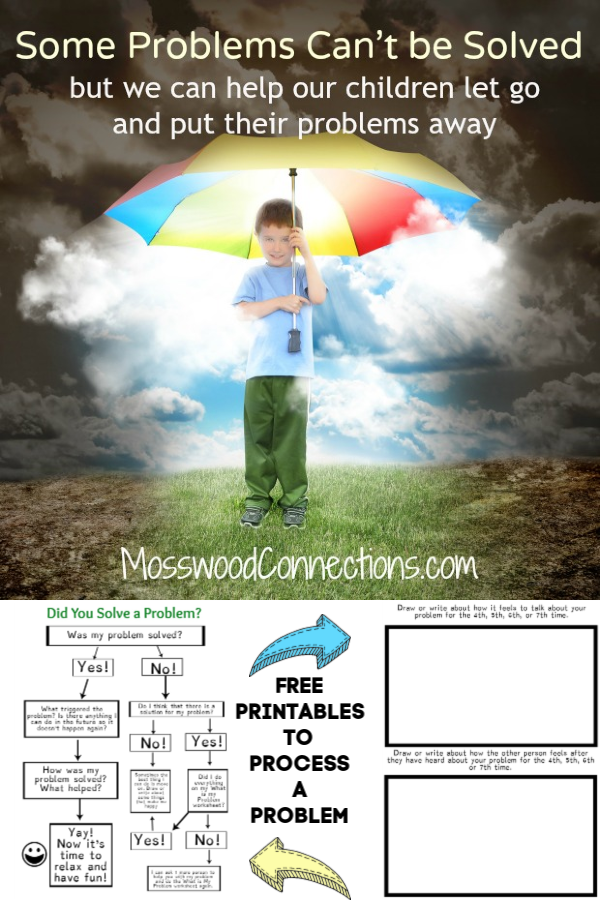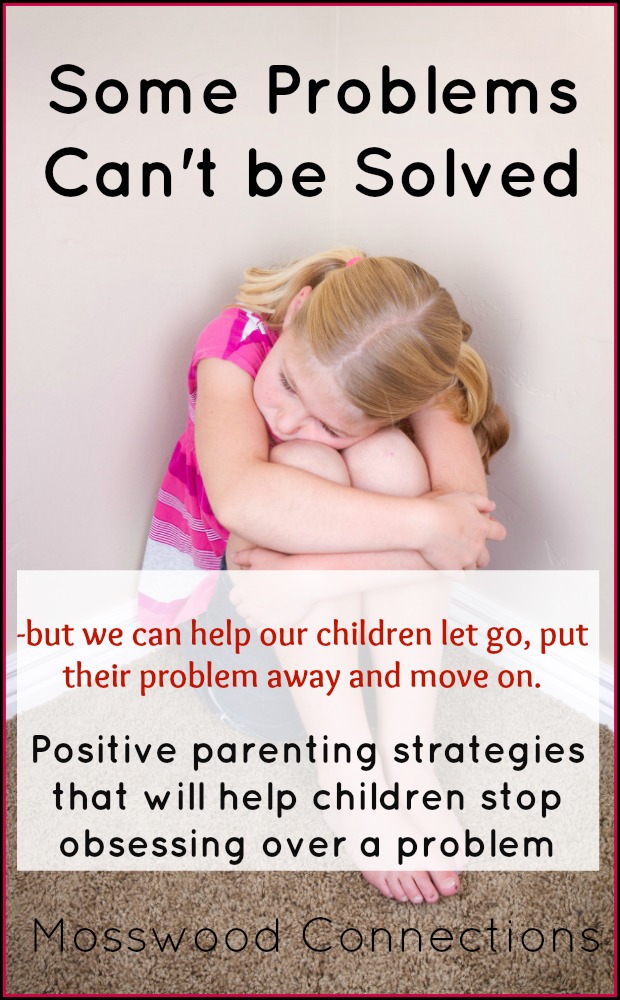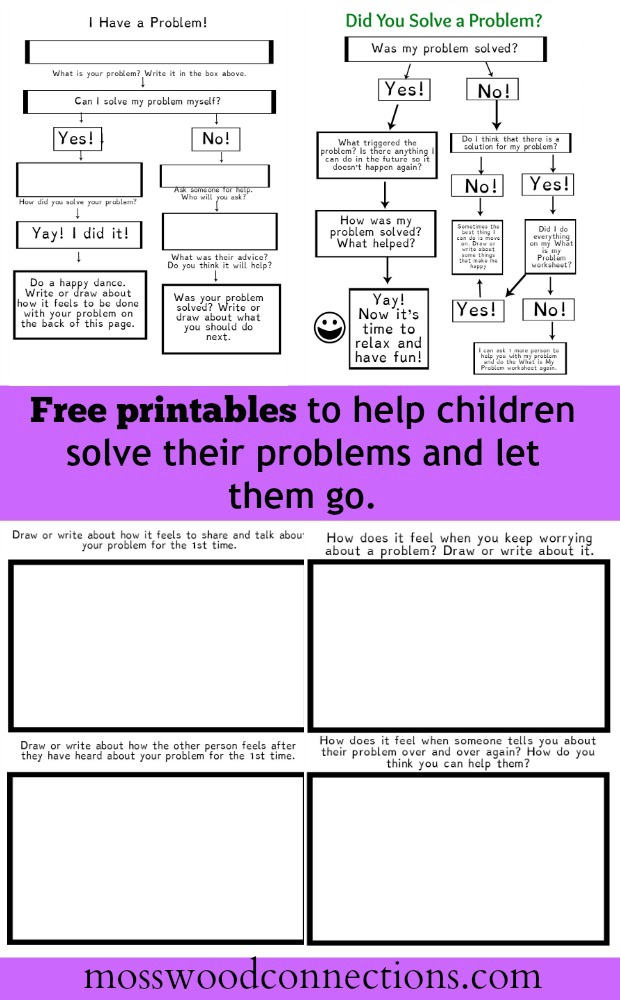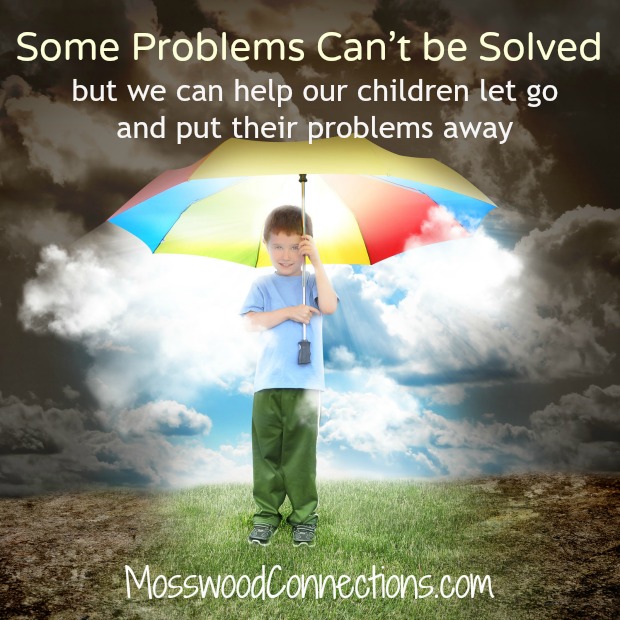Problem-Solving Strategies for Anxious Children
Raising Anxious Kids
Teach children problem-solving skills.
Sarah and I play therapists who also practice positive parenting. Over the years we have spent a lot of time helping children process their feelings, talk about their problems, and practice problem-solving. I cannot express how rewarding it has been. We have watched fearful children become brave, angry children become calm, impulsive children become patient.
This post contains affiliate links. Please visit our disclosure page for more information.

Problem-Solving Techniques Do Work
Usually, our problem-solving techniques work. Feelings are identified and processed. Problems are discussed and solutions are offered. We feel better and move on. But sometimes there is that child who cannot let go of a problem. There can be many reasons why they persist. Maybe they are anxious or expect that all problems have a solution, or they like the attention they get when they are talking about their problems. Whatever the reason is, it can become unhealthy to continue to focus on a problem or complaint. So what do you do?
What happens when children can’t let go of a problem?
Many years ago, I worked with a child on the autism spectrum. She also experienced anxiety and obsessive qualities. She always had a problem to discuss. I would do activities to process her feelings, work on possible solutions and comfort her when she was distressed. I meant well, but it became apparent that somewhere along the road she had decided that she was a victim. My well-intended attempts to soothe and help her with problem-solving only resulted in her life revolving around her problems. I had to try a different way. I instituted a few rules. She could talk about her problem with three different people, no more. Once she had talked about her problem with her three chosen confidantes she was done talking about it with them. During the day she was to focus on what was happening in her daily life and at the end of the day, she could have 15 minutes to vent.
Sometimes doing the right thing feels wrong
I will be honest. It felt mean. I’m very empathetic and I wish that I could have the superhero power to solve every child’s problem. I had to face that sometimes when we talk a problem to death we are solidifying the idea that the problem is real and big enough to demand more attention.

Does Your Child Constantly Complain?
I wrote this post in response to a friend who is exasperated by her son’s incessant insistence to talk out the same problems over and over again. She is beginning to be concerned (and annoyed) about his constant complaints about the same problems over and over again. I have learned from my mistakes so I offered to make some worksheets and graphics to help her son learn when and how to solve a problem and when to put it away.
She wondered if that would be too harsh and I reminded her that it is always better when children learn from the people who love them while they are in a safe environment. The rest of the world will not be so careful with their feelings. Putting problems away is part of a positive intervention and positive parenting.
Download the I Have a Problem worksheet
Download the Did I Solve the Problem worksheet
Download the How Does it Feel to Talk About Your Problem for the First time? worksheet
Download the Talking About a Problem too Much worksheet

Is it time to stop problem-solving, move on, and put the problem away?
Before you decide that it’s time to put a problem away consider a few things. Is there really a problem? Can the problem be solved? If it’s possible to solve the problem has the child received all the help and support that they need? If there is no solution is there a way to help the child feel better?
Some problems have no solutions. The way that you respond to handling this will depend on what the problem is. If a grandparent dies that is a real problem with no real solution. The best we can do is to help the child handle their grief. If a child is upset because they want to invite 12 friends to their party but there is only space for 10 then the solution is to simply cut down your guest list. That may not be the solution they want but it is real life. There is no absolute rule on how to handle it. That’s when you just trust your intuition and trust that you know the child.
If you have a child who continues to obsess over the same problem try our Problem Solving Worksheets. I think they will help!
Playing games is an excellent way to teach children the skills to solve their problems by themselves. That way you can avoid the victim trap before it begins. ![]()
Here are some games we recommend that will support teaching children how to problem-solve on their own.
The Stop, Relax & Think Collection; If you know children who have a hard time relaxing, then you must own this collection. It features the highly popular Stop, Relax & Think game, card game, script book, workbook, and The Stop, Relax & Think Counseling Ball.
The Self-Esteem Game builds self-esteem and guides children on how they can do their own problem-solving in difficult or new situations.
The Conflict Resolution Game: Teaches Children 12 Ways to Deal with Common and Uncommon Problems Children move forward when they find empathetic and positive ways to solve problems.
Teaching resilience will also help children to stop complaining about their problems. Hang in There! “teaches players that resilience is one of the crucial character strengths needed for success in school, sports, career, and life in general. By learning from past mistakes instead of allowing failure to take over, players will learn key strategies to persevere creating greater self-esteem and confidence.”
Let’s all work on raising resilient children who have good problem-solving skills and who also know when to let a problem go.

